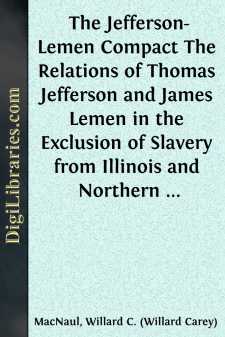Categories
- Antiques & Collectibles 13
- Architecture 36
- Art 48
- Bibles 22
- Biography & Autobiography 813
- Body, Mind & Spirit 142
- Business & Economics 28
- Children's Books 17
- Children's Fiction 14
- Computers 4
- Cooking 94
- Crafts & Hobbies 4
- Drama 346
- Education 46
- Family & Relationships 57
- Fiction 11829
- Games 19
- Gardening 17
- Health & Fitness 34
- History 1377
- House & Home 1
- Humor 147
- Juvenile Fiction 1873
- Juvenile Nonfiction 202
- Language Arts & Disciplines 88
- Law 16
- Literary Collections 686
- Literary Criticism 179
- Mathematics 13
- Medical 41
- Music 40
- Nature 179
- Non-Classifiable 1768
- Performing Arts 7
- Periodicals 1453
- Philosophy 64
- Photography 2
- Poetry 896
- Political Science 203
- Psychology 42
- Reference 154
- Religion 513
- Science 126
- Self-Help 84
- Social Science 81
- Sports & Recreation 34
- Study Aids 3
- Technology & Engineering 59
- Transportation 23
- Travel 463
- True Crime 29
The Jefferson-Lemen Compact The Relations of Thomas Jefferson and James Lemen in the Exclusion of Slavery from Illinois and Northern Territory with Related Documents 1781-1818
Categories:
Description:
Excerpt
In view of the approaching centennary of statehood in Illinois, the name of James Lemen takes on a timely interest because of his services—social, religious, and political—in the making of the Commonwealth. He was a native of Virginia, born and reared in the vicinity of Harper's Ferry. He served a two-years' enlistment in the Revolutionary War under Washington, and afterwards returned to his regiment during the siege of Yorktown. His "Yorktown Notes" in his diary give some interesting glimpses of his participation in that campaign. His Scotch ancestors had served in a similar cause under Cromwell, whose wedding gift to one of their number is still cherished as a family heirloom.
Upon leaving the army James Lemen married Catherine Ogle, daughter of Captain Joseph Ogle, whose name is perpetuated in that of Ogle county, Illinois. The Ogles were of old English stock, some of whom at least were found on the side of Cromwell and the Commonwealth. Catherine's family at one time lived on the South Branch of the Potomac, although at the time of her marriage her home was near Wheeling. Captain Ogle's commission, signed by Gov. Patrick Henry, is now a valued possession of one of Mrs. Lemen's descendants. James and Catherine Lemen were well fitted by nature and training for braving the hardships and brightening the privations of life on the frontier, far removed from home and friends, or even the abodes of their nearest white kinsmen.
During, and even before the war, young Lemen is reputed to have been the protégé of Thomas Jefferson, through whose influence he became a civil and religious leader in the pioneer period of Illinois history. Gov. Reynolds, in his writings relating to this period, gives various sketches of the man and his family, and his name occurs frequently in the records of the times. He was among the first to follow Col. Clark's men to the Illinois country, where he established the settlement of New Design, one of the earliest American colonies in what was, previous to his arrival, the "Illinois county" of the Old Dominion. Here he served, first as a justice of the peace, and then as a judge of the court of the original county of St. Clair, and thus acquired the title of "Judge Lemen." Here, too, he became the progenitor of the numerous Illinois branch of the Lemen family, whose genealogy and family history was recently published by Messrs. Frank and Joseph B. Lemen—a volume of some four hundred and fifty pages, and embracing some five hundred members of the family.
True to his avowed purpose in coming to Illinois, young Lemen became a leader of anti-slavery sentiment in the new Territory, and, undoubtedly, deserves to be called one of the Fathers of the Free State Constitution, which was framed in 1818 and preserved in 1824. His homestead, the "Old Lemen Fort" at New Design, which is still the comfortable home of the present owner, is the birthplace of the Baptist denomination in Illinois; and he himself is commemorated as the recognized founder of that faith in this State, by a granite shaft in the family burial plot directly in front of the old home. This memorial was dedicated in 1909 by Col. William Jennings Bryan, whose father, Judge Bryan, of Salem, Illinois, was the first to suggest it as a well-deserved honor.
James Lemen, Sr., also became the father and leader of the noted "Lemen Family Preachers," consisting of himself and six stalwart sons, all but one of whom were regularly ordained Baptist ministers. The eldest son, Robert, although never ordained, was quite as active and efficient in the cause as any of the family. This remarkable family eventually became the nucleus of a group of anti-slavery Baptist churches in Illinois which had a very important influence upon the issue of that question in the State....


